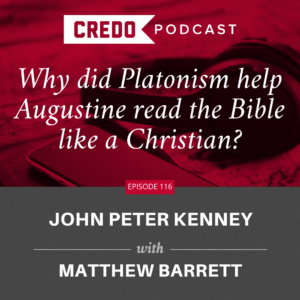Show Notes
 What did Augustine and Athanasius, Origen and the Cappadocians, Boethius and Aquinas all have in common? They all critically appropriated Platonism. Platonism was not a set of doctrines that proved convenient. Rather, Platonism was an epic, even revolutionary outlook on transcendent reality that defied a materialistic understanding of God and the world. For example, Platonism prepared Augustine for Christianity’s transcendentalism. Augustine left behind his Manichaeism after reading the Platonist books, which opened his eyes to an infinite God and the the spiritual meaning of Scripture. Nevertheless, Platonism could only take Augustine to the summit; apart from Christ he could only look at the homeland from afar. And yet, if corrected and transformed, Platonism’s realism could be put into the service of Christianity. Augustine believed Christian Platonism could serve as a perennial philosophy.
What did Augustine and Athanasius, Origen and the Cappadocians, Boethius and Aquinas all have in common? They all critically appropriated Platonism. Platonism was not a set of doctrines that proved convenient. Rather, Platonism was an epic, even revolutionary outlook on transcendent reality that defied a materialistic understanding of God and the world. For example, Platonism prepared Augustine for Christianity’s transcendentalism. Augustine left behind his Manichaeism after reading the Platonist books, which opened his eyes to an infinite God and the the spiritual meaning of Scripture. Nevertheless, Platonism could only take Augustine to the summit; apart from Christ he could only look at the homeland from afar. And yet, if corrected and transformed, Platonism’s realism could be put into the service of Christianity. Augustine believed Christian Platonism could serve as a perennial philosophy.
John Peter Kenney, an expert on the history of Christian Platonism, joins Matthew Barrett to discuss Augustine’s Confessions and City of God. Together they explore Augustine’s metaphysic, listening to the church father as he explains how God providentially used Platonism to correct his reading of the Bible and prepare him for the humiliation of a crucified and risen Christ. Using Augustine as a test case, Kenney reflects on the significance of Christian Platonism for theology and practice today.
John Peter Kenney is Professor Emeritus of Religious Studies at Saint Michael’s College. He is the author of Mystical Monotheism: A Study in Ancient Platonic Thought, Contemplation and Classical Christianity: A Study in Augustine, and he is the co-editor of Christian Platonism: A History.
Matthew Barrett is the editor-in-chief of Credo Magazine and host of the Credo podcast. He is associate professor of Christian theology at Midwestern Baptist Theological Seminary and Director of the Center for Classical Theology. He is the author of the award-winning Simply Trinity and his new book is called, The Reformation as Renewal. He is currently writing a Systematic Theology (Baker Academic).
